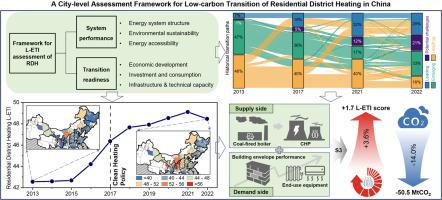A city-level assessment framework for low-carbon transition of residential district heating in China
IF 10.9
1区 环境科学与生态学
Q1 ENGINEERING, ENVIRONMENTAL
引用次数: 0
Abstract
The energy transition of residential district heating (RDH) in China has achieved remarkable progress, driven by improvements in heating efficiency, optimization of energy structures, and enhanced building energy performance on the demand side. The implementation of clean heating policies has further accelerated this process. This study develops a Low-carbon Energy Transition Index (L-ETI) to evaluate the progress of RDH energy transition in 129 cities from 2013 to 2022, focusing on two dimensions: energy system performance and transition readiness. Our findings reveal significant disparities in the energy transition progress among cities. Although the L-ETI scores for RDH have generally increased over time, the transition faces substantial challenges due to insufficient driving forces. We demonstrate the positive impact of clean heating policies on promoting RDH energy transition, particularly in the “2+26” key cities. Furthermore, we estimate that if the heating facility mix and building energy efficiency levels (adjusted for climatic factors) in all cities were elevated to the top 10% national benchmark, total carbon emissions from RDH could be reduced by 50.5 MtCO2 (14.0%). This study provides an in-depth analysis of RDH energy transition, offering valuable insights for similar analyses in other sectors and serving as a reference for city policymakers.

中国城市居民集中供热低碳转型评估框架
在供热效率提高、能源结构优化和需求侧建筑节能性能提升的推动下,中国住宅区域供热能源转型取得了显著进展。清洁供暖政策的实施进一步加速了这一进程。本文构建了低碳能源转型指数(L-ETI),从能源系统绩效和转型准备度两个维度对2013 - 2022年中国129个城市的低碳能源转型进展进行了评价。我们的研究结果揭示了城市间能源转型进展的显著差异。尽管随着时间的推移,RDH的L-ETI得分普遍有所增加,但由于动力不足,转型面临着重大挑战。我们展示了清洁供暖政策对促进RDH能源转型的积极影响,特别是在“2+26”重点城市。此外,我们估计,如果所有城市的供暖设施组合和建筑能效水平(根据气候因素进行调整)提高到国家基准的前10%,则RDH的总碳排放量可以减少5050万吨二氧化碳(14.0%)。本研究提供了对RDH能源转型的深入分析,为其他行业的类似分析提供了有价值的见解,并为城市决策者提供了参考。
本文章由计算机程序翻译,如有差异,请以英文原文为准。
求助全文
约1分钟内获得全文
求助全文
来源期刊

Resources Conservation and Recycling
环境科学-工程:环境
CiteScore
22.90
自引率
6.10%
发文量
625
审稿时长
23 days
期刊介绍:
The journal Resources, Conservation & Recycling welcomes contributions from research, which consider sustainable management and conservation of resources. The journal prioritizes understanding the transformation processes crucial for transitioning toward more sustainable production and consumption systems. It highlights technological, economic, institutional, and policy aspects related to specific resource management practices such as conservation, recycling, and resource substitution, as well as broader strategies like improving resource productivity and restructuring production and consumption patterns.
Contributions may address regional, national, or international scales and can range from individual resources or technologies to entire sectors or systems. Authors are encouraged to explore scientific and methodological issues alongside practical, environmental, and economic implications. However, manuscripts focusing solely on laboratory experiments without discussing their broader implications will not be considered for publication in the journal.
 求助内容:
求助内容: 应助结果提醒方式:
应助结果提醒方式:


